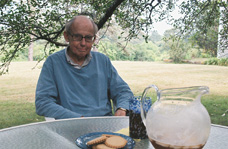John McCain, the maverick Republican Senator from Arizona, was diagnosed with brain cancer a year ago now, so there’s not much time left for this remarkably resilient politician to take a final stand. Will McCain live long enough to vote for — or against — Brett Kavanaugh, Trump’s second Supreme Court nominee? He did vote to confirm Neil Gorsuch, but will he return to the Capitol to help overthrow Roe V. Wade?
Who is McCain really — is he the independent spirit who rode the Straight Talk Express campaign bus during the 1999/2000 Presidential Primary?
Or is he the far more conventional conservative who surrendered to the right wing and selected Sarah Palin the second time he ran for the presidency? Clearly, he’s all of the above, which makes it difficult to anticipate his actions.
Jenny Attiyeh interviewed McCain during the New Hampshire Presidential Primary in 1999, when he was still the front runner. Back then he was the darling of the media, and was portrayed as a forthright, reformist candidate. He went on to defeat George W. Bush in the New Hampshire primary, only to fall victim to a smear campaign in South Carolina — he’d fathered a black child, was a traitor to his country — from which he never recovered.
Recently, of course, McCain’s been subjected to the taunts of President Trump. He’s endured far worse — try five years as a prisoner of war, tortured by the North Vietnamese. But now that the end is very nearly here, will he figure out what it is he really stands for?
In his latest book, The Restless Wave: Good Times, Just Causes, Great Fights, and Other Appreciations, McCain expresses regret over his VP pick in 2008. Perhaps as the clock ticks out his final hours, he’ll reach beyond words, to something more like action. Or, as this book review states, will he continue to try to have it both ways?
Podcast: Play in new window | Download
Subscribe: RSS


 About 40 years ago, farms were thick on the ground in
About 40 years ago, farms were thick on the ground in 